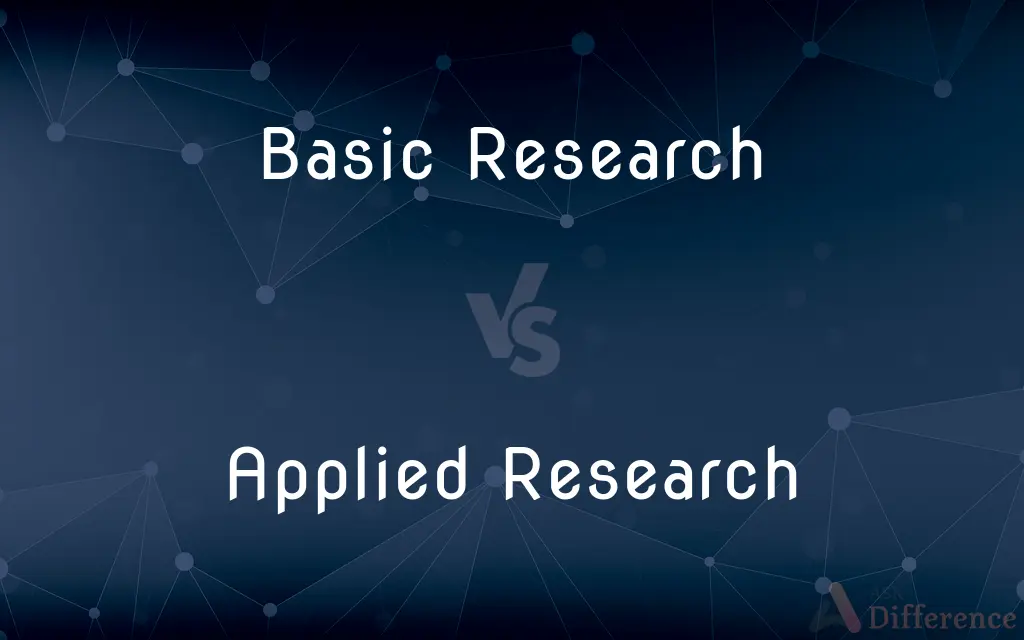Basic Research vs. Applied Research — What's the Difference?
By Tayyaba Rehman — Published on November 9, 2023
Basic Research seeks to expand knowledge and understanding without immediate application. Applied Research aims to solve specific problems or develop products or processes.

Difference Between Basic Research and Applied Research
Table of Contents
ADVERTISEMENT
Key Differences
Basic Research dives into theoretical explorations, aimed at enlarging knowledge without an immediate practical application in view. Applied Research, on the other hand, is deployed with a clear practical objective, often addressing real-world problems, seeking viable solutions or product development. Both forms uphold significant importance in the field of scientific and business research and can be perceived as two ends of a research spectrum.
In Basic Research, scholars might explore scientific phenomena without the goal of creating a specific product or process. Contrarily, Applied Research is invariably associated with the intent to apply its findings to solving specific problems, producing a tangible outcome, such as a new technology, policy, or procedure. While Basic Research propels the frontiers of understanding and lays the groundwork for further exploration, Applied Research utilizes existing knowledge to bring forth implementations and innovations in varied fields.
A clear example of Basic Research is investigating the fundamental properties of matter, which does not have an immediate application but broadens scientific understanding. Applied Research, in contrast, could be exemplified by developing a new drug to tackle a specific health issue, hence putting theory to practical use. These research approaches, while divergent in purpose, are integral and interconnected in the grand schema of research and development.
Basic Research often leads to findings that, while not immediately applicable, become the foundation upon which Applied Research is built. The foundational theories or principles unveiled through Basic Research serve as the bedrock upon which Applied Research projects are constructed, guiding them towards feasible solutions. Applied Research, therefore, often leans on the outcomes of Basic Research to inform its trajectory.
While Basic Research can be deemed as an investigation rooted in curiosity, a quest for enlarging understanding, and creating a pool of knowledge, Applied Research typically plays a direct role in policy formulation, technological advancements, and social implementations. Both types of research play crucial roles in progress and innovation and often intersect and build upon each other in practice.
ADVERTISEMENT
Comparison Chart
Purpose
Expand knowledge without immediate application
Solve specific problems or develop applications
Application
Generally not immediate
Immediate and direct
Focus
Theoretical exploration
Practical problem-solving
Outcome Expectation
Adds to a knowledge pool
Produces tangible solutions/products
Role in Development & Progress
Foundation for further research & understanding
Directly influences policies & technological advancements
Compare with Definitions
Basic Research
Basic Research is inquiry aimed at gaining knowledge for its own sake.
The scientist engaged in Basic Research to understand cellular structures.
Applied Research
Applied Research is geared towards solving specific, practical problems.
The team conducted Applied Research to develop a new water purification system.
Basic Research
Basic Research explores theories without aiming for immediate practical application.
His Basic Research on photon behaviors provided vital insights into light properties.
Applied Research
Applied Research intertwines theory and practice to generate tangible improvements.
His Applied Research in agriculture formulated new techniques for sustainable farming.
Basic Research
Basic Research dives into understanding fundamental principles in any research domain.
Her Basic Research in psychology explored the underlying mechanisms of cognitive development.
Applied Research
Applied Research employs existing knowledge to attain specific outcomes.
Applied Research in medical science resulted in the creation of the new vaccine.
Basic Research
Basic Research contributes to the scientific knowledge base without targeted practical ends.
Basic Research in mathematics often unveils new theories without instant real-world use.
Applied Research
In Applied Research, the focus is on obtaining solutions to real-world issues.
The firm utilized Applied Research to enhance the efficiency of its production processes.
Basic Research
In Basic Research, the primary motive is to expand understanding and uncover knowledge.
The laboratory focused on Basic Research in chemistry, exploring molecular interactions.
Applied Research
Applied Research often results in the creation of new products, practices, or policies.
Applied Research in education shaped the new remote learning policies amid the pandemic.
Common Curiosities
Can Basic Research lead to technological innovations?
While not its primary aim, Basic Research can indirectly lead to innovations by providing foundational knowledge that may be applied in future.
How are Basic Research and Applied Research interconnected?
Basic Research often lays the foundational knowledge upon which Applied Research can build to develop practical applications.
Do academic institutions engage in Applied Research?
Yes, academic institutions often engage in Applied Research to solve practical problems and contribute to real-world applications.
How does Applied Research benefit industries?
Applied Research directly benefits industries by providing specific solutions, developing new products, or improving processes.
Is Applied Research focused on practical problem-solving?
Yes, Applied Research is focused on addressing specific problems and developing practical solutions or applications.
In what sectors is Applied Research commonly utilized?
Applied Research is utilized across various sectors including healthcare, technology, agriculture, and business, aimed at solving sector-specific problems.
How critical is Basic Research to scientific progress?
Immensely critical, as Basic Research provides the foundational knowledge and theories upon which further studies and innovations can be built.
What is the main aim of Basic Research?
Basic Research aims to expand and enhance understanding and knowledge without immediate practical applications.
Can Basic Research lead to Applied Research?
Absolutely, Basic Research often provides the foundational knowledge that Applied Research utilizes to create practical solutions.
Is market research a type of Applied Research?
Yes, market research can be considered Applied Research as it seeks to address practical issues related to consumer behavior and market trends.
Does Basic Research follow scientific methodologies?
Yes, Basic Research employs scientific methodologies to ensure the validity and reliability of the knowledge it generates.
Can Applied Research exist without Basic Research?
While possible, Applied Research often relies on the foundational knowledge generated by Basic Research to formulate solutions.
What funding challenges does Applied Research face?
Applied Research may face funding challenges due to budget constraints, or if the expected outcomes are not deemed commercially or socially valuable.
Can Applied Research influence policy-making?
Yes, findings from Applied Research can significantly influence policy-making by providing data-driven solutions to societal issues.
Are the results of Basic Research always used in applied settings?
Not always, while Basic Research can inform Applied Research, its primary aim is knowledge expansion, not immediate practical application.
Share Your Discovery

Previous Comparison
Hydrogen Atom vs. Hydrogen Ion
Next Comparison
Constitution vs. Declaration of IndependenceAuthor Spotlight
Written by
Tayyaba RehmanTayyaba Rehman is a distinguished writer, currently serving as a primary contributor to askdifference.com. As a researcher in semantics and etymology, Tayyaba's passion for the complexity of languages and their distinctions has found a perfect home on the platform. Tayyaba delves into the intricacies of language, distinguishing between commonly confused words and phrases, thereby providing clarity for readers worldwide.













































